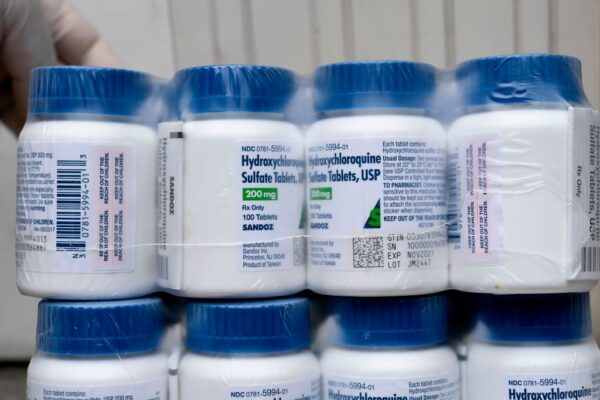
A decades-old malaria drug touted by President Donald Trump for the treatment of Covid-19 got two black eyes from federal government agencies Tuesday as a study under the Department of Veterans Affairs found it did not offer any benefit, while a panel of experts convened by the National Institutes of Health recommended against its use outside clinical trials due to toxicity.
In a preprint paper posted in an online database of research that has not yet undergone peer review, researchers did a retrospective analysis of patients hospitalized with Covid-19 who received the drug, hydroxychloroquine, by itself and in combination with an antibiotic, azithromycin. Although the study was a retrospective analysis rather than a randomized, controlled clinical trial, it has a large sample size, with 368 patients.
The study found there was no evidence that using hydroxychloroquine – with or without azithromycin – reduced patients’ risk of having to be put on mechanical ventilation, and that overall mortality was higher among patients treated with hydroxychloroquine alone.
“These findings highlight the importance of awaiting the results of ongoing, prospective, randomized, controlled studies before widespread adoption of these drugs,” the researchers wrote.
While hydroxychloroquine and a closely related drug, chloroquine, have garnered interest as potential therapies for Covid-19, the results so far from a variety of mostly small studies have been mixed, with some showing a potential benefit and others showing none or even having to be stopped due to toxicity. Last month, the Food and Drug Administration issued an emergency use authorization, or EUA, for the drugs for patients unable to take part in clinical trials, though that decision attracted controversy. Public interest in the drugs – driven by Trump and certain political media figures’ promotion of them – has made them difficult to obtain for patients with diseases for which they are indicated, such as lupus, while also reportedly challenging recruitment in clinical trials of other antiviral treatments like Gilead Sciences’ remdesivir.
In addition to the VA study, a panel of experts at the NIH’s National Institute of Allergy and Infectious Diseases recommended against use of hydroxychloroquine and azithromycin outside of clinical trials due to potential toxicities, according to a guidance that was also issued Tuesday. The panel included more than four dozen experts from 13 medical organizations and federal agencies.

A Deep-dive Into Specialty Pharma
A specialty drug is a class of prescription medications used to treat complex, chronic or rare medical conditions. Although this classification was originally intended to define the treatment of rare, also termed “orphan” diseases, affecting fewer than 200,000 people in the US, more recently, specialty drugs have emerged as the cornerstone of treatment for chronic and complex diseases such as cancer, autoimmune conditions, diabetes, hepatitis C, and HIV/AIDS.
Photo: Yuri Cortez, AFP, via Getty Images














